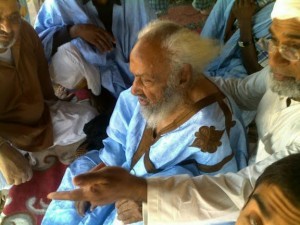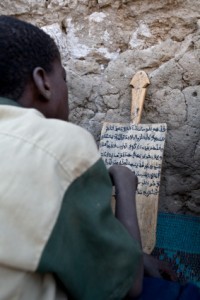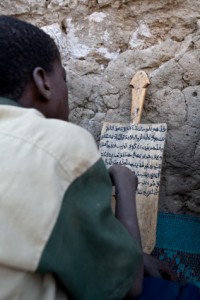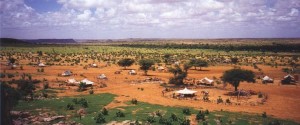Links:
Books recommended for new Muslims (converts) and new practicing Muslims
Some books recommended by Shaykh Hamza Yusuf
Ebrahim Moosa – Cii News (19-06-12)
If you are someone who longs to study Islam in a setting that rekindles the golden days of Islamic scholarship; a place where the currency is sacrifice and simplicity; and where the fruits to be reaped are pure and abundant knowledge, insight and sincerity – Mauritania may just be the place you are looking for.
Many in the ‘First World’ have never heard of a country called Mauritania, and even fewer would be able to point out its location on a map. But the West African nation, famed for its harsh climate and simple nomadic lifestyle, seems to possess a certain mystery that each year lures hundreds of seekers, even from the most sophisticated suburbia around the world, to its barren and dusty plains.
Those who were enchanted by it describe its inhabitants as people who live as close as possible to the time of the earliest generation of Muslims and consciously choose to do so. Even more entrancing is their description of Murabit al Hajj – a distinguished Mauritanian Aalim and stalwart of the traditional learning methodology, who is still active in disseminating knowledge despite his advanced age. Based on observations of his character, methodology and ways, some scholars have even said that if there were a companion of Muhammed SAW still alive today, it would have been him.
 The legendary Sheikh Murabit al-Hajj
The legendary Sheikh Murabit al-Hajj
Learning in this desert land is firmly rooted in an age-old oral tradition. For successive generations, many Mauritanians have memorized the Quraan in its entirety through individual tuition from a teacher, with no access whatsoever to a copy of a Mushaf in the process. In fact, these written manuscripts are still a rare sight in many rural parts of the country. Let alone the Quraan, many women of the nomadic tribes are said to be memorisers of entire collections of Hadith.
“These are people who are connected to the methodology and process of learning from Prophetic Times, all teaching in the middle of a desert under trees, where you make your own ink and write on slates of wood,” says Australian scholar Imam Afroz Ali, who recently toured South Africa. Comparing his time spent seeking Islamic knowledge in Mauritania with other formal Islamic studies he undertook elsewhere, he observes: “In contrast to university-based Islamic learning, traditional learning sees that you learn directly from one teacher and classical texts rather than commentaries. I found that the traditional learning system was far more holistic, far more complete and in fact directly connected to a far more interesting point that university learning tries to assert but may not in fact provide. I would say our traditional methodical system actually provides solutions to the modern problems we find ourselves in. Traditional learning systems by far surpasses any other learning system I have come across.”
According to an article written by Shaykh Muhammad Rami Nsour, the method of learning in the “mahdhara’s” of Mauritania utilizes the lawh, or wooden tablet, whereby the text is written in charcoal ink on the tablet and then memorised and studied under the watchful guidance of the shuyukh. Everything that is studied is committed to memory, and this is one of the reasons why the scholars of Mauritania (also known as Shinqitt) were held in high esteem wherever they went. Children from the villages first memorise the Quran, starting at about seven years of age. After memorizing it, they study the ‘rasm’, which is the science related to writing the Quran according to the ‘Uthmani script. Next, they study the Quran a second time, this time writing it on their tablets from memory. After that, they move on to pursue further studies in fiqh, grammar, aqidah and hadith.
The entire lesson occurs on a one-on-one basis with the teacher, although other students may be present, listening in to try and benefit from any additional points made to the new student. Each interaction typically lasts for about 5-10 minutes to allow for the rest of the students to have their turns.
Imam Afroz says the practical difficulties posed by such learning methods add value to the knowledge being imbibed. “It all sounds very primitive, but I can tell there is a mystery, a kind of mysterious secret, a kind of a blessing that actually is in there, where you can truly appreciate what you are learning. You know, when you have paper that you can waste by the ton, you don’t really take care when you want to write something. But when you write on a piece of slate with a small amount of ink, you’d better think before you write. But with tons of paper you just become complacent – these little nuances can make a huge difference.”
 ‘Lawh’ Wooden Tablet Used by students in Mauritania
‘Lawh’ Wooden Tablet Used by students in Mauritania
At the peak of summer, temperatures in the region can reach 40 degrees. There is no electricity and the water inhabitants drink appears brown because of the desert sand. Still, Imam Afroz maintains, one should not dismiss the intellectual and academic standing of the locals merely based on their apparent poverty and lack of development. “Perceptions are problematic. Mauritania is seen as one of the least literate countries in the world. The problem in how the UN measures that literacy, because their literacy measure is based on two things – English and the decimal system. But Mauritanians read Arabic and use the duodecimal system!”
He cautions that the villagers should not be mistaken to be primitive simply because they live simply. “Their way of living is actually quite sophisticated. With their duodecimal systems, they can do calculations on their fingers and minds better than a student with a calculator.”
The village, known as Tuwamarat, where Sheikh Murabit al Hajj is based, lies in a mountain state which most Mauritanians themselves are unfamiliar with. There are no phones in the village, and when a car is in the vicinity, it is said that its sound is heard long before it arrives.
Such isolation may seem extreme – even punishing to people from the West who have grown accustomed to the luxuries of life. But Imam Afroz has no regrets: “Living itself is not easy, it is physically tough on yourself, but at the same time it is that toughness that actually makes you humble. It also makes you think twice about your life. When I came out of there, I transformed my ability to look and think about what is around me. Without that experience I would have a very theoretical and third-person experience of what living Islam is all about.”
The Ulama of Mauritania are famed for their expertise in the Fiqh of the Maliki Math-hab. Amongst the renowned students of Sheikh Murabit al Hajj and graduates of the Mauritanian traditional learning system is Sheikh Hamza Yusuf, orator and founder of the Zaytuna Institute, currently based in California.
ebmoosa@ciibroadcasting.com
source: http://www.ciibroadcasting.com/2012/06/19/unlocking-the-secrets-of-islam-in-dusty-mauritania/









Comments
One response to “Unlocking the Secrets of Islam in Dusty Mauritania”
I am always happy when i see myself as a musleem.